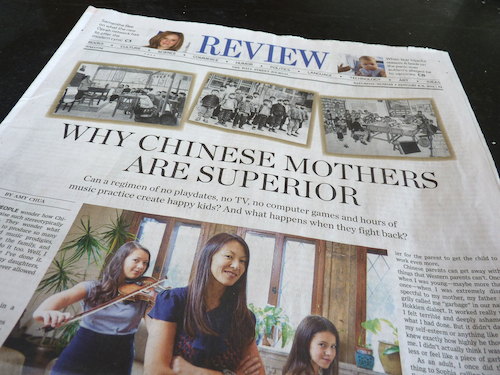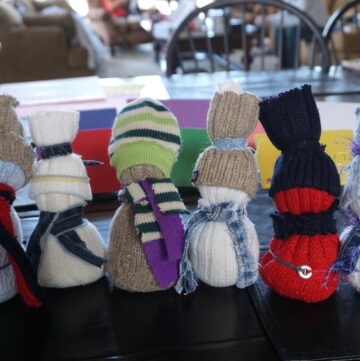Many friends have sent me the article by Amy Chua in last weekend’s Wall Street Journal, “Why Chinese Mothers are Superior,” asking what I think of it. For those of you who have not read the article, Yale law professor Chua writes about her experience raising her two daughters in the stereotypical Chinese fashion: command-and-control, emphasis on academic excellence and endless practicing of classical piano and violin. No playdates, no choice, no arguments. The article is excerpted from her book, Battle Hymn of the Tiger Mother, and it certainly had the intended effect of raising controversy to promote sales.
The article presents a deliberately extreme view of a Chinese stereotype – so extreme that many readers thought it was intended as satire. In it the Chinese mother is arrogant, righteous, living out her need for glory by pushing her children to achieve her idea of success. Many readers, commenting on the article, were offended by the portrayal. Many others related to it. I think any Asian out there recognizes the stereotype, whether or not it was his or her own experience. Of course there’s no way to generalize a billion people, but here’s my take on the Chinese approach to child rearing and what it means in modern America.
Positive ideas
Emphasis on education – The cultural emphasis on education is a definite positive. Education starts in the home, years before kids make it to school age. Even the best of schools cannot overcome an undervaluing of education in the home. Even engaged American parents are often more involved with their kids’ sports than their school work, considering education the teacher’s responsibility. The idea that education is something that just happens at school is absurd to Asian parents.
Successful schools come from communities that value education. Extra spending cannot combat parental indifference. Infamously, Washington DC is one of the highest-spending districts in the nation, and its performance remains among the lowest. On the flip side, William Faria Elementary in Cupertino, California, is in a district that spends less than half the amount per pupil than Washington DC does, yet its test scores rank among the top in the state. Faria Elementary is 95% Asian, and many of them are even non-native English speakers. Is it a model for how schools can do more with less funding? Of course not. Credit here goes to the families.
Belief in hard work – This is a fundamentally important concept to the success of many Asian students. Asian parents do not accept the idea that their child cannot learn a particular subject: any concept can be conquered with enough effort. Still learning English? Work harder. Having trouble with science? Get help. In the Asian culture, the reaction to obstacles is simple: more effort.
Malcolm Gladwell’s idea in Outliers that success is more about practice and favorable conditions than inherent genius is not a surprising one to Asians. The reason why many Asian students are academic outliers is not attributable to higher IQ but to hours of focused work.
Outdated ideas
Status orientation – Waiting to be let into my cousin’s gated community in Los Angeles some years ago, my husband and I were amused to observe a stream of Mercedes cars driving in and out of the gate, all driven by Asian women. This focus on status symbols is one reason that so many Asian parents want their kids to get straight As, to play the piano or violin, to go to Ivy League schools, to be doctors. It’s also a reason that many Asian parents discourage kids from socially questionable activities, such as performing arts or even athletics. Even though this limited view is not how Americans view success, many Chinese in America still maintain this narrow definition because it’s meaningful within their Chinese community.
Kids as social security – Asian parents want their kids to be financially successful not just for the status it brings the family but also because they expect their children to provide for them in their old age. For many Asian parents, the children have a deep debt to their parents that will someday need to be repaid. But this is no longer feudal China, and in the modern world grown children can easily choose never to see their parents again.
It’s a risky proposition to raise children with the expectation of payback. As a friend once said as her oldest child was leaving for college, “You think you have kids. But they’re only on loan.” Pressuring kids with indebtedness is not the way to get them to return.
Exclusive focus on academic achievement – The idea of intellectual excellence as a path toward a better future is long held in China. In the second century BC, Imperial exams were introduced to China, giving peasants a chance at income and status by becoming a government officer. Even today, academic success in China is a numbers game: top ranked students get into top ranked universities, and top graduates from top universities get the best jobs. But financial success in America – even gaining admission into top universities – is about much more than academic performance, and in fact here such single-mindedness is seen as unbalanced.
Dangerous ideas
Unrelenting pressure to succeed – Certainly this is not just an Asian concept, and perhaps it is intensified in immigrant families. Andre Agassi’s dad as described in the tennis chamipion’s autobiography, Open, was every bit as abusively overbearing as Amy Chua described herself in the Wall Street Journal piece. These types of parents exist everywhere, though perhaps this approach is more culturally acceptable among Asians. Many Asians in fact take a personal pride in driving their children to success and feel their harsh words and methods are necessary to achieve it. But too many children crack under this kind of pressure, resulting in depression, anxiety and in extreme cases, suicide.
Many hard-driving parents would say they simply want to see their children achieve their potential. In the 1980s, people became excited about child prodigies. Academically advanced kids were encouraged to skip grades. There was a race to see which child would be the youngest to graduate college. My brother’s friend was one of these kids, graduating college at maybe 12 or 13, with a PhD in hand before his friends finished high school. And then what? Nothing. He got a job and worked like everyone else. Except because he skipped childhood he’s been working for longer and has few friends.
Directive approach – When I took a tour in China in 1999, the tour guide would occasionally stop the bus and pronounce, “You take picture here,” in a typically Chinese directive approach. There is a hierarchy to social relations in China that has roots in Confucianism, with filial piety, duty and obedience as fundamental values. The drill sergeant approach may have made sense in old China, but in modern America teaching kids how to navigate a world of choices is a critical life skill. They cannot learn this if parents do not allow them any choice at all.
In her article, Amy Chua relates “a story in favor of coercion, Chinese-style,” in which she forces her seven year old daughter Lulu – using physical force, yelling, insults and threats – to learn a difficult piano piece. She relates the story with pride as a lesson in successful parenting, saying that she knew her daughter was capable of learning it because her sister had been able to play it at the same age. By that logic, Chua might as well reason that Mozart was composing at age five and she should berate Lulu into that as well.
A preschool teacher I know, when asked what she thought about academic vs play-based preschools, said what she had learned after years of teaching was that you could spend all year getting a two year old to learn concepts that a five year old could learn in a day. After four kids I’ve learned the same goes for potty training – you can fight over it for months, or if you wait until the child is ready, it happens with no effort at all.
Directive parents need to think hard about whether destroying the brief and precious freedom of childhood is worth the questionable achievement of the parental timetable.
Conditional love – I’m sure Amy Chua and other parents like her would insist that they love their children unconditionally, but their implacable demands send a different message to their kids of conditional approval. Unconditional love provides children with a base of psychological stability, a safety net for life. With it they can feel comfortable taking risks, knowing that no matter what happens they will be loved. Constant fear of losing the love or approval of parents is likely to lead to a life of anger and resentment or unbearable anxiety. Neither scenario is a happy one.
Bottom line
The funny thing about the furor that has arisen from this article is that not even the author actually thinks that Chinese mothers are superior. On the cover of her book is this subtitle:
This is the story of a mother, two daughters, and two dogs.
This was supposed to be a story about how Chinese parents are better at raising kids than Western ones.
But instead, it’s about a bitter clash of cultures, a fleeting taste of glory, and how I was humbled by a thirteen-year-old.
In an interview on sfgate.com, this is what Amy Chua has to say,
“I was very surprised,” she says. “The Journal basically strung together the most controversial sections of the book. And I had no idea they’d put that kind of a title on it. But the worst thing was, they didn’t even hint that the book is about a journey, and that the person at beginning of the book is different from the person at the end – that I get my comeuppance and retreat from this very strict Chinese parenting model.”
I think every hands-on parent goes into parenting with a lot more confidence than they come out of it. People that don’t have kids – we all used to be there – are full of ideas: my kids will do this, my kids won’t do that. But what we discover in real parenting is that kids are not a block of marble waiting to be sculpted by parents into a shape of their choosing. In the beginning it looks that way. But inside the block of marble there is already a solild bronze sculpture. Parents that are hell-bent on a having certain kind of statue use all kinds of sharp and blunt instruments to make the unformed block into the shape they want, but what they end up with is a brittle blend of carefully sculpted but fragile marble and battered but still unbroken bronze. A parent that recognizes their bronze sculpture for what it is can work carefully over time to free the bronze of its marble case and have in the end a whole bronze sculpture in its original form.
To quote again from the wise Anna Quindlen in her essay, “Goodbye, Dr Spock”:
When they were very small I suppose I thought someday they would become who they were because of what I’d done. Now I suspect they simply grew into their true selves because they demanded in a thousand ways that I back off and let them be.
This article has prompted some amazing discussions, one of the best on quora.com. Another brave soul shared a heartbreaking story of her model minority sister, an overachiever who did everything her traditionally demanding Chinese parents asked of her and committed suicide at age 30.
But 6 years since her passing, I can tell you that the notion of the “superior Chinese mother” that my mom carried with her also died with my sister on October 28, 2004. If you were to ask my mom today if this style of parenting worked for her, she’ll point to a few boxes of report cards, trophies, piano books, photo albums and Harvard degrees and gladly trade it all to have my sister back.
I think Amy Chua was brave to present such a detestable portrait of herself as a lesson for others. Many of us don’t want to admit that sometimes we are not our best selves as parents. It’s a funny thing to learn that going from knowing it all (pre-kids) to knowing nothing (post-kids) is actually progress. It’s not where we start that is important; it’s how we develop and where we end up.






Brilliant! And comforting to me as a retired parent. Not sure why exactly. I’ll put that on my list of things to analyze later.
I was reading this article yesterday and thinking what you think about it. You’re so quick, thanks!
Bravo!
Wonderful response! I too was forwarded this article and it is definitely food for thought.
Thank you for such a thoughtful and intelligent response. When I read this article I also thought of an woman (Manling Williams) on trial in LA for murdering her husband and two children. It’s impossible to really understand why anyone would do this, but her only defense was humiliation suffered at the hands of her Chinese parents.
thanks, joan. what a story…
I finally have time to read through this…feel so smart after reading your article. It’s so clever and thoughtful. I’m waiting for your book, Chinese Grandma!
To be the master of oneself and one’s passions, to understand the rightness of one’s moral law and to obey it out of a sense of inward affinity to what’s good and natural; to practice virtue as its own reward, freely; to view one’s sense of duty serenely and make it one with one’s will and desires; and to stand firm in the face of hardship or even annihilation, without bending to coercion from tyrants or losing oneself in any frenzied mob — this is the ideal of discipline that cuts against the grain of the Chinese method, which, despite the good intentions of many of its practitioners, must be recognized for what it is: i.e., the relic of an authoritarian and collectivistic, however stable, culture and a tool for the perpetuation of the same. The mettle to confront mortal danger, eagerly if principle requires it and always with composure, does not come from yielding in childhood to threats of starvation, corporeal punishment, sequestration of property, and the like. On the contrary, someone who values freedom and deserves it tries to teach himself and his child to be indifferent to such debasing stimuli; whereas a child raised to respond to them — and their lowest common denominator is always brute force — grows up to be a cowardly, obedient serf of his parents, elders, and dictators. The only form of discipline he learns is that of endurance, which is also the main virtue he is expected to practice throughout his life as the subject of an absolute external authority that can’t be argued or reasoned with. But said serf might learn to play “The Little White Donkey†at the age of seven, and that’s worth something, right?
This is such a good analysis. I shared it on my facebook!
hi yanny, you are sweet! thanks for recommending the piece. very glad to know you found it useful. =)
You’re right. All through Chinese history (?5000yrs), Children = Retirement Plan. Even today, I’m not sure what is the retirement plan of Chinese in China, now that one working couple would have to support 4 seniors. Do the Chinese in China have enough savings for a gracious retirement?
as an educator and as a mother…amen! love your wisdom; love your honesty, love your presence out there…and in here.
I took years of ballet lessons, piano lessons, and extra classes/ tutoring. I made sure I got good grades (never less than a b). My mom has always been more demanding and nit picky (since she’s japanese) than other moms. She says it’s because she has pride in me. I definitely wasn’t a model kid and didn’t graduate at the very top of my class. But, I’m happy to say that I ended up pretty good and it’s probably mostly her doing. The best part of the whole thing? I make sure my husband knows that I’m superior to him and was raised to be so! 🙂
kim, you are funny. i agree high standards are great for kids – it’s the laundry list of specific expectations that’s a joy-killer. i think that’s where a lot of parents go wrong.
Dear all.. why do we need to be superiour as a mother? So that we can raise robotic kids that gain prizes to get some fleeting glory on stage or podium? And that the kid would feel inferiour because s/he does not live up the expectation of mother superiour?
I am Chinese and I definitely do not raise children the way Chua described in her books. The best way to encourage learning is teaching children an enquiring mind and freedom to explore the world, learning failure is not a negative thing. This is contradictory to getting a kid to practise n hours per day and then to shove them up to the stage (whether they wish it or not) to perform. My kids play instruments, they have played in orchestras and won prizes, but at no time i would ask them to practice. As parent, i merely provide the opportunity, the environment and the support. And to be clear, support does not mean pushing, cajoling until the child acquiece and do practice when s/he does not wish to. Support means accepting success and failure with the same smile, celebrate or commiserate together, and most important of all – provide uncondiational love.